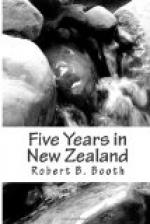It was strange and very pleasant to feel the solid ground under our feet after 94 days at sea, and we sat awhile with the whale men before resuming our boat. Then we proceeded quietly down the Bay, which was very beautiful, the dense and variegated primeval forests clothing the lower portions of the hills and fringing the ravines and gullies to the shore, the pretty caves and bays lying in sheltered nooks, with a mountain stream or cascade to complete the picture, and all undefiled by the hand of man. The bold outline of the bare rocky summits, the deep blue of the silent calm bay, and the distant view of the little Port of Lyttelton picturesquely sloping up the hillside.
Seeing no sign of the ship, and fearing to approach the town, we rowed into a little sandy cove, where we fastened the boat and proceeded to ascend the hill to endeavour to discover the ship’s whereabouts. About half-way we came upon a neat shepherd’s cottage in one of the most picturesque localities imaginable, and commanding a magnificent view of the bay and harbour. On calling we found the cottage occupied by the shepherd’s wife, a pleasant buxom Scots-woman, who immediately proffered us food, an offer too tempting to be declined, and we presently sat down to our first Colonial meal of excellent home-made bread, mutton, and tea, and how delighted we were to taste the fine fresh mutton after many weeks of salt junk and leathery fowls on board the “Mary Anne”!
We had finished our hearty dinner, and were giving our loquacious hostess all the news we could of the old country, when the ship hove in sight, towed by a little tug steamer. We ran for our boat and gave chase, but only reached her side as the anchor was being dropped in Lyttelton Harbour. We received from the Captain and Lapworth a sound but good-humoured rating, but there would be no opportunity of further “larks” from the “Mary Anne”! The voyage was over, and a most pleasant one it had been, especially for our small party, and I am sure that no voyagers to the New World ever had the luck to travel with kinder or more sympathetic captain and officers, or with abler seamen, than those in command of the good ship “Mary Anne.”
Poor Mrs. Kelson was in sore distress about her husband, whom she persisted in giving up for lost, and doubtless she looked pretty sharply after his movements for a while.




